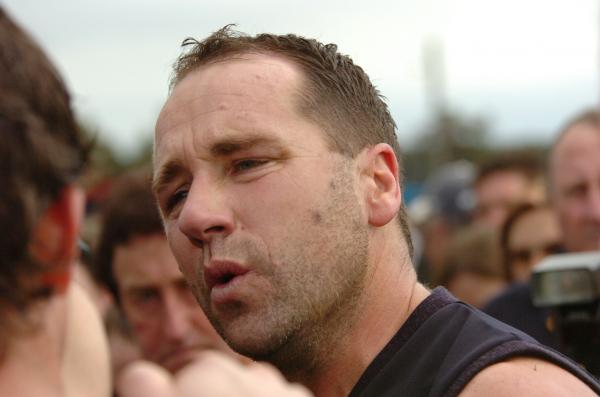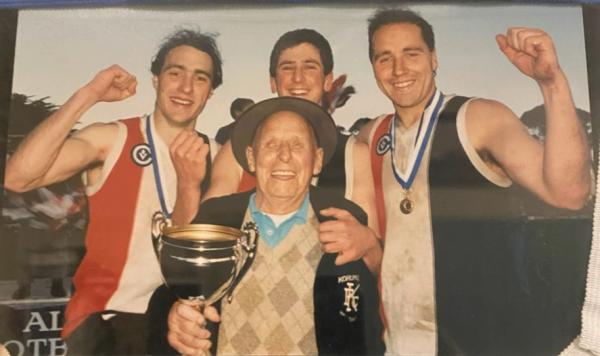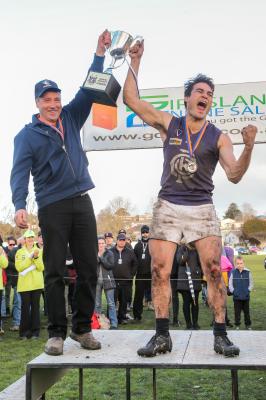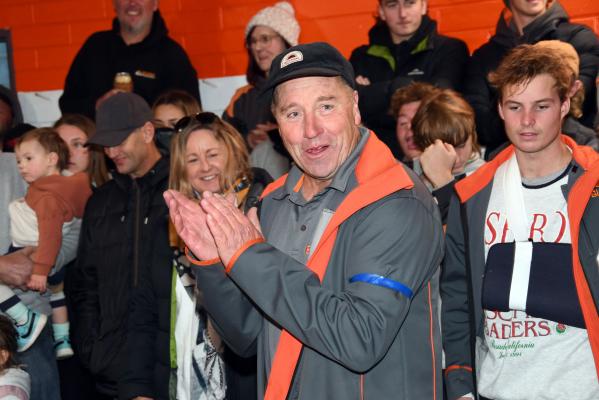By David Nagel
Gippsland football legend Paul Alger was a veteran 30-year-old when he claimed his first senior premiership as a playing coach at Nyora in 1993.
But, remarkably, the grapes were only then beginning to ferment on a brilliant playing and coaching career that would scribe five further success stories to secure Alger’s legacy as one of the greats of football in the district.
Throw in 499 senior games – yes, by his own doing, one short of 500 – three-consecutive Alf Walton Medals for being the best and fairest player in the Ellinbank and District Football League, and one Mid-Gippsland League medal, and Alger’s career is one of rare and exquisite highs.
Alger’s magnificent journey began when he was born in 1963…a born and bred Korumburra lad who went to school locally and lived in the same house all the way through his childhood.
“My school life was pretty uneventful to be honest, just like most kids we’d get home from school and go to the park and have a kick of the footy or play cricket, whatever season it was, until mum called us home for tea, usually after dark,” Alger said.
“We were lucky; we probably had 20 kids floating around kicking the footy and beginning to learn our craft.
“I had no idea what I wanted to do as a kid, but my uncle was a plumber, I did an apprenticeship with him and I’m still a plumber today.”
Alger, now married to Kathryn and with three children, Millie, Bridget and Patrick, began a long and distinguished football journey at age 13, playing in the Korumburra fourths and progressing through the thirds.
By today’s standards he was a late starter, but showed enough talent to win a club best and fairest award through those junior days. His dad Jim was a senior player at the club, during a successful era in Korumburra’s history.
“Korumburra was successful through that time in the ‘70s, a very successful club,” Alger remembered.
“Dad always played at Korumburra, we’d go to the footy every Saturday, and when dad stopped playing he was an umpire and then an umpire’s advisor for a long time, so we were always around footy clubs.
“And my grade-six teacher, Bill Jeffs, was a key player in the day, a tough full-back during the hard days. It was a different game back then, no order off rule; she was pretty rugged footy back in the day.”
Alger’s life-long love for the game wasn’t totally ingrained as he headed from the thirds into senior football. He was preparing to have a year off before a change of mind saw him pull on the boots, a few games into the 1982 season.
“I wasn’t going to play, but decided to play in about round two or three,” he said.
“I trained Thursday, played in the reserves, and then because someone didn’t show up I played in the seniors as well. I was buggered; I couldn’t walk for three days.”
Despite not tasting the ultimate success with his home club, Alger remembers his nine years at Korumburra with great fondness. He also remembers the moment when he realised he would have to leave his home town to pursue his new-found love of coaching.
“My initial time at Korumburra was awesome, a great bunch of blokes,” he said.
“It was different back then, we’d all knock around together, we were great mates and we lost a couple of grand finals, one to Inverloch and one to Wonthaggi, but never had much success.
“Then we battled for a couple of years, but I coached the thirds to premierships in 1989 and 1990.
“They offered me the coaching job at Korumburra but I didn’t think I was the right man at the time. I was too social with the players and it would have been hard going from being their mate to telling them what to do so I decided to go elsewhere.”
Alger had already built a reputation as a gun player at the club, winning multiple best and fairest awards before making the move to Nyora – as playing coach – for the 1991 season.
“I was going alright, I reckon the best year I ever had as a player at Korumburra was in 1989, when I was coaching the thirds, the young blokes would all hang around and watch us play and I really enjoyed that year,” Alger said.
“In 1990 I was impeded with a crook ankle, but had to play because we were so undermanned.”
Alger would then play the best football of his career, winning his three Alf Walton Medals in his first three years with Nyora, 1991, ’92 and ’93. His third medal, in ’93, would coincide with a drought-breaking senior premiership at the club.
“When I went there Nyora was down the bottom of the ladder, so we were basically starting from scratch,” he said.
“I did my knee in my first game with the club and missed four or five games, which wasn’t the ideal start.
“We were ok in ‘91, but then in ’92 we won every game except one in the second half of the season and missed the finals by half a percent. I reckon we were nearly good enough to win it that year, but we started a bit ordinary.
“We were flying home but just missed out….but we were ready in ’93.”
Nyora secured some key recruits, Jason Harwood from the SWGFL, with Peter Fowles from Bena filling the centre half back position. The Saints also had some young local talent starting to make their mark on the big stage.
“Nyora had some good locals, Jack Heylen, he was a great player, and John Allsop, he was only a young full forward but became a super player as well,” Alger recalls.
“His brother was a ruckman, and there were others who were really good as well. We recruited well but had some quality young players to begin with.
“Winning that flag with Nyora was pretty special, their first in 40 years, it was great, it was awesome, one of the three best days of my life I reckon…1997 and 2005 were the only two days to top it.”
Alger would stay at Nyora in 1994 before continuing his growing reputation as a player and coach at Yarragon in 1995, ’96.
The club had won just two games in two years prior to Alger’s arrival, but would finish fourth and third in his only two years at the club.
Alger would also dominate the midfield for Yarragon, winning a fourth league best and fairest award in 1996.
“It’s probably not what you want to hear for your story, but the league medals don’t mean that much to me to be honest,” Alger explained.
“I couldn’t even tell you where those medals are. For me it’s more about team success…but it might be good to look back on those things one day.”
Alger enjoyed his time at Yarragon, but the heart strings were pulling strongly and eventually lured him back to Korumburra for the 1997 season.
“I would have stayed at Yarragon, but I lost my grandmother while I was there and my grandfather, who followed Korumburra his whole life, he wasn’t well, so I went back to Korumburra in 1997 to coach them,” Alger recalled.
“My brother Aaron and my cousin Dean were both playing there as well so it was a pretty emotional time for the family.”
Korumburra, who had finished ninth the previous year, would go on to record a memorable premiership win, one Alger can recall as if it happened yesterday.
“That was the best day of my life, if I could take one day back in my life, bottle it and relive it, that would be the day,” Alger said with real passion.
“We weren’t the best side, Inverloch were. We only lost one game each but they were better than us, then they beat us fairly easy in the second semi.
“We were beating sides by three or four goals, where they were beating the same sides by 14 or 15 goals, they were smashing sides…they were better, but we were just better on the day.
The premiership-winning player-coach remembers that things started to change in the grand final just before half time.
“They were five goals up, just before half time, but we got a late goal and our full back ran through their full forward, a heavy clash, and you could just feel at half time that the momentum might be changing a bit,” Alger recalls.
“We had a really good third quarter, putting our noses in front, and then finished off the job…it was just an awesome day all round.
“After what happened with my Nan, to have my Pop (Mick) up on the podium, who followed Korumburra all his life, it was just really special.
“He was holding up the cup with me, my brother and my cousin. My cousin (Dean) kicked eight, and missed one after the siren to make it nine, against good opposition. We all played well and contributed which made it even more special.
“We won that flag forking out just $19,000…we did it for the love of the jumper.”
Alger would then quickly realise the move back to Korumburra was timely…with some bad news on the horizon.
“We went on the footy trip a couple of weeks later and when we came back my grandfather was in hospital and I remember him saying, ‘At least I got to see you win a grand final’.
“I said, ‘What are you talking about Pop, you’ll be around for years’…but he died a fortnight later.
“A few weeks after the grand final he was dead…I would never have forgiven myself if I didn’t go back to Korumburra that year.”
With the greatest day of his life now firmly tucked away in the memory bank, Alger would coach Korumburra until 2001, the year the club amalgamated and became Korumburra-Bena.
It was then off to Catani, as a spritely 39-year-old, in 2002, to begin an association that would eventually translate into three premierships with the navy blues.
In his first stint at Catani Alger would be playing-coach at the club for nine years.
“When I went there they were eighth or ninth on the ladder and the first year we finished third, then second in 2003,” Alger recalls.
“In 2003 we won 11 of 12 quarters in the finals series but didn’t win the grand final…that’s unbelievable isn’t it.
“We won our first two finals and then Poowong jumped us in the grand final, they were five goals up at quarter time and that was it.
“They had a good side Poowong, but to lose just one quarter during that finals series and not come away with a flag was really disappointing.”
Catani would then win the first of back-to-back flags against Buln Buln in 2004, before repeating the dose against his former club Nyora a year later.
“We had control of that game against Buln in 2004,” Alger said.
“We had an emerging Owen Fitzpatrick, first year out of the thirds, who would end up kicking 1000 goals for Catani. We were pretty lucky there, to have a young group coming through that could all play good footy.
“Owen was centre half forward, he was great, played nine games in the seniors, nine in the reserves, and was best on ground in a grand final.
“Luke McFarlane, his brother Dan, Owen’s brother Shane, we just had a good group of locals, all playing for nothing.
“Owen kicked 147 goals one year and didn’t get paid a cent.”
If 2004 was memorable for breaking a 12-year drought at the club, then 2005 would prove to be one of the best days in Paul Alger’s decorated football career.
“Nyora was a better side than us that year, they were 25 points in front at the 20-minute mark of the third quarter, and they had the wind in the last quarter, we were in massive trouble,” Alger said.
“Then we kicked 10 goals in a row in 25 minutes and it was all over.”
Catani was inspired that day by its ailing captain Michael Stockx, who ignored doctors’ advice to receive treatment for Hodgkin’s disease so he could play a part in the back-to-back premiership win.
“He played through that finals series with cancer, which was unbelievable,” Alger remembers.
“He was getting chemotherapy but still played terrific that day Mike. He was a super player Mike Stockx, he lost all his hair but provided us all with some really great memories.
“That was awesome that day…one of my two greatest memories in all my time in football.”
Alger quickly fell in love with Catani.
“I ended up coaching them for 13 years, nine years the first time and four years after that, and you don’t do that if a club isn’t full of good people,” he said.
“They recruit good people, everyone has a good time, the social life is good, it’s just no fuss. People go there for a year and stay there 10. It’s just full of good people.
“And they were great blokes, you’d be laughing your guts out at training and on footy trips your guts would be aching from laughing so much.
“There were some seriously funny guys hanging around that footy club.”
Alger would then take a step back and coach the Drouin reserves in 2011 and ’12, and help run the bench for senior coach Ben Soumilas.
It was then off to Buln Buln for a two-year stint that – yep you guessed it – would also result in a flag.
“They were always the arch rival, and that was one place I thought I would never go to, but I did, and I’m glad I did, I made some lifelong friends at Buln,” Alger explained.
“Most footy clubs are full of good people, if you don’t fit in it’s usually yourself that’s the problem, and premierships are hard to win.
“It was great to get to the finals with a healthy list at Buln and play well when it mattered most.”
Alger would have two seasons at Buln Buln, winning five games in 2013 and then securing that elusive premiership in year two.
It was also during this time that he had a decision to make…to play his 500th senior game of football or to give a young kid a go!
“You can’t preach team first to everyone and then put yourself before the team, can you,” Alger explained.
“I could have played the 500th game numerous times, even my kids ask me why I didn’t do it, but why would I do it when I can give a kid his first game and I would have minimal impact.
“I played 499 senior games, and well over 100 in the reserves and other grades…the 500 senior games just didn’t bother me that much to tell you the truth.”
Alger would play his last game of senior football at age 50.
“I was at Buln Buln and ironically we played Catani in round one and that was my 50th birthday,” he said.
“We stayed at Catani and had a party in their rooms after we played them, I knew my way around the place,” he said with a chuckle.
Alger would then win his sixth premiership, and his third with Catani, in 2017, after returning to Taplins Road in 2015.
“After Buln I was going to have a year off but Josh Tymensen was coach at Catani, he was a great player, but wanted a year off from coaching to basically concentrate on his footy,” Alger recalls.
“I came in to coach, initially to help out, but ended up staying for four years.”
Catani would finish tenth in 2015, and eleventh in 2016, before a gut-busting defensive effort through the 2017 finals series would secure the club’s first flag since the emotional triumph – Alger led – in 2005.
“Our boys trained really hard that pre-season, but Neerim beat us by 139 points in round two, they were awesome, and it looked like a case of how far…they looked unbeatable,” Alger said.
“Then we beat them by a couple of goals at Catani the next time we played them and knocked them off by two points in the prelim.
“Our blokes were so fit and the defensive effort was awesome, we defended like our lives depended on it.”
After scoring just two points in the last quarter of the preliminary final, Catani would then defend even harder, not scoring at all in the last quarter of a thrilling one-point grand final win over Warragul Industrials.
“We defended small leads and got over the line, and I firmly believe that if the boys didn’t do the work early in the pre-season, and their fitness wasn’t where it should be, we don’t win those games of footy,” Alger said.
“I remember blokes standing up like Luke McFarlane, who played in 2004 and ‘05, and he was now at the end of his career, doing some incredible things, the effort was just unreal.”
Alger, who is currently reassessing his options after finishing a three-year coaching stint at Korumburra-Bena, said he feels lucky to have had such a charmed run in the game.
“A lot of blokes are giving it away at 30, but I won my first premiership at that age and have now played in four and coached two from the sidelines,” he said.
“Every one of them was special. I never went to a club that was flying, always to a club that was struggling, never above eighth on the ladder. Footy clubs are a good place to be, and recruiting is easier, when you’re on the rise.
“The longest we waited for a premiership at a new club was three years, and that’s something I’m probably most proud of.”
Alger is also proud of his consistency that saw him initially dominate with his 180-centimetre and 85-kilo frame, and then evolve as a player in his mid-to-late 40s.
“I was still playing on the ball at Catani, in my mid-40s, but footy was different in the early days,” he said.
“In the early days you go on the ball and you hardly ever change. If you took somebody off the ground it was like you were cutting their leg off.
“Now you’ve got midfielders wanting to come off all the time because they have to bust a gut to get from one end of the ground to the other.
“I kept myself pretty fit and could take a good mark overhead…they were probably the things that gave me an advantage.
“And I’m a great believer that you can’t turn form on and off. I was confident I was going to play well every week and when I went to Nyora I guaranteed them I would play well every week.
“I think sometimes if you can play pretty good, but you don’t play well every week, you’re just being lazy.”
And for a six-time premiership coach, his coaching philosophies are fairly simple.
“Obviously tactics come into play, and each team has their own game plan, but in general for me it comes down to effort,” he said.
“Effort is not negotiable. Ever since the first ball was bounced the side that tries the hardest is going to win more games than they lose.
“And people skills are important, the first bloke picked in the seniors or the last bloke picked in the reserves, everyone has to be treated with the same level of respect.”
So how does he reflect on his brilliant career, still possibly not complete, to this point in time?
“I’ve got no memorabilia or anything, it’s all what’s in my mind, the memories, the great memories, and I’ve got a great collection of memories that I can look back on at any time,” Alger said.
“It’s the memories and making friends that it’s all about, making life-long friends that you can share those memories with.
“I’ve been pretty lucky all the way through, lucky that my body held out for so long. I played for 20 years after I was 30, and not many get to do that.”
Alger said his longevity in the game did come with the odd reminder.
“When I went back to Korumburra for the last few years, I was coaching kids that I played with their parents, and one kid I coached I played with his grandfather (Josh Hill)…geez I’m getting old.”
And what separates his career, his legacy…above the rest?
“I think it all comes down to winning premierships, that’s what footy clubs get judged on, whether that’s right or wrong, that’s how they get compared to each other,” Alger said.
“The joy on people’s faces, when everyone has worked so hard, over a long period of time, it’s just indescribable.
“People love their footy clubs, love them, and put in a lot of volunteer hours, so to see the joy on their faces, when you get over the line, it’s priceless, you can’t describe it.
“And especially when you’re playing. I still remember how it feels to play in a senior premiership, when the siren goes, only one team can win it, it’s indescribable.
“Even now, just coaching, I know what the players are going through. It’s just awesome to think that you’ve played a small role in helping the players experience that feeling.”
You’ve played more than a small role Paul Alger…six premierships as coach is a true testament to that!










